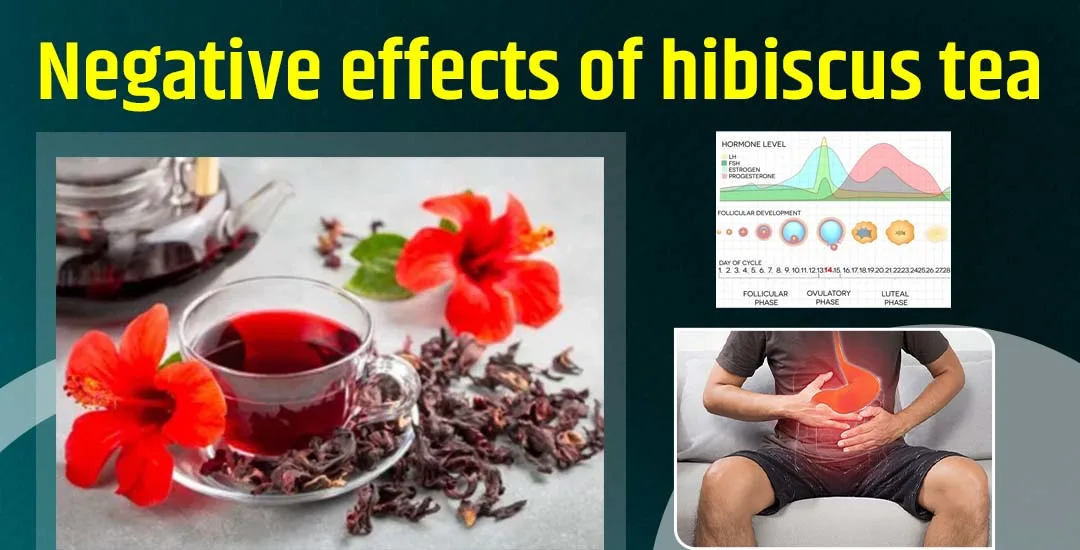
Hibiscus tea is popular for its health benefits, but it may also cause side effects. These include low blood pressure, kidney stress, hormonal changes, and digestive issues. People with certain health conditions or on medications should avoid excessive use of hibiscus tea. Here’s what you need to know before drinking it regularly.
We’ve all heard the rave reviews. Hibiscus tea is the Beyoncé of the herbal tea world; bright, bold, beautiful, and full of health benefits. It's praised for lowering blood pressure, boosting liver health, and making you feel like you're sipping on a tropical vacation in the middle of your living room. But have you ever thought about the negative effects of hibiscus tea?
So, grab your favorite mug (maybe fill it with water this time) and let’s talk about the hibiscus tea effect on kidneys, because even health trends deserve a reality check.
1. It Might Lower Your Blood Pressure a Little Too Well
Hibiscus tea is famous for its blood pressure-lowering superpowers. Encouraging News for Those Battling High Blood Pressure! But if you're someone whose blood pressure is already in the "normal and chill" category, hibiscus might just push you into the "whoa, why am I dizzy?" zone.
In medical speak, hibiscus can cause hypotension, a fancy word for "low blood pressure that might make you feel like you're about to audition for a fainting scene in a Victorian drama."
Warning signs include:
- Dizziness
- Light-headedness
- Feeling like you just got up too fast... but you were sitting the whole time
So, if you’re already taking blood pressure medications or have naturally low blood pressure, talk to your doc before inviting hibiscus to your tea party.
2. It Could Mingle With Your Medications (And Not in a Good Way)
Hibiscus is a social butterfly; it interacts. But not always in a good way.
Certain medications don’t vibe well with hibiscus. For example:
- Hydrochlorothiazide (a diuretic): Hibiscus might interfere with how it's absorbed.
- Acetaminophen: Some research suggests hibiscus could speed up how fast it's cleared from your system, so you may not get the pain relief you’re expecting.
- Antiviral meds and some chemotherapy drugs: There are some interactions noted here, too.
So, if you're on medication and still want to sip on that crimson brew, check in with your healthcare provider. (Yes, even the one who told you to “drink more herbal tea”, let's clarify which herbal tea.)
3. It Might Not Be Baby-Friendly
Pregnant or nursing? Put the hibiscus tea down for a sec.
Hibiscus has been shown in some studies to affect estrogen levels and even stimulate menstruation. That’s not exactly ideal when you're trying not to trigger early labor. The hibiscus tea side effects on estrogen must be taken into consideration, especially if you are expecting a baby.
The same goes for breastfeeding; while there isn’t as much research, the lack of data alone is enough to proceed with caution. Let’s not turn your milk into a science experiment, shall we?
4. It Could Be a Little Too Acidic for Your Taste Buds
Hibiscus tea is tart. Like, T-A-R-T. It could give lemonade a run for its money. And while that zingy flavor is part of the charm, it’s also not great for:
- People with acid reflux (GERD)
- Those prone to heartburn
- Anyone whose stomach throws tantrums when exposed to acidity
And let’s not forget your teeth. That bright red color comes with natural acids that can erode enamel over time. So, if you’re sipping it daily and smiling a lot, just make sure your dentist isn’t secretly judging you.
Pro tip: Drink through a straw like a classy iced latte aficionado. Your teeth will thank you.
5. It Might Mess with Your Blood Sugar (in Weird Ways)
Some studies show hibiscus may help lower blood sugar. Sounds amazing, right? Diabetes, who?
But not so fast. If you're already managing diabetes with medication, hibiscus could lower your blood sugar too much. Next thing you know, you're hangry, shaky, and side-eyeing a granola bar like it owes you money.
Just like with blood pressure, more isn’t always better. Hibiscus can be a team player, but not the MVP if you're not keeping score.
6. Allergies Are Rare... But Not Impossible
Hibiscus comes from the mallow family (related to okra and cotton, oddly enough), and while allergies are uncommon, they can happen.
Symptoms might include:
- Itchy eyes
- Sinus issues
- Skin rashes
- That awkward feeling of “wait… am I allergic to tea?!”
As always, if you’re trying hibiscus for the first time, maybe don’t drink a gallon of it. Ease in, listen to your body, and maybe have Benadryl on standby if you’re feeling brave.
Final Sip: Should You Ditch the Tea?
Let’s be clear: hibiscus tea isn’t evil. The negative effects of hibiscus tea can be a deterrent, but it still has plenty of potential health perks: antioxidants, heart-friendly compounds, and that gorgeous Instagram-worthy color.
But like any good thing (chocolate, Netflix, swiping on dating apps), moderation is key. Consume the daily dose of hibiscus tea, as prescribed by your doctor. If you're on meds, pregnant, or have health conditions, treat hibiscus like that one overenthusiastic party guest; fun in small doses, but don’t let it take over the night.
So, sip wisely, laugh often, and maybe don't trust everything with a wellness hashtag.
FAQ
Is hibiscus good for heartburn?
It may help, but for some, it can worsen acid reflux.
Can hibiscus tea cause diarrhea?
Yes, in large amounts, it may have a mild laxative effect.
Hibiscus tea benefits for women
It can regulate periods, improve skin, and lower blood pressure.
